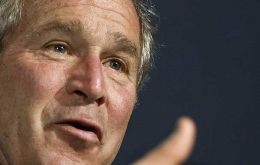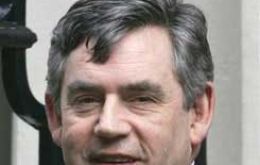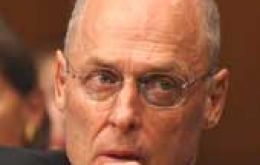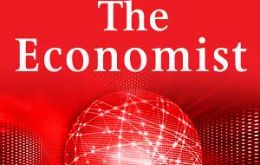MercoPress. South Atlantic News Agency
Economy
-
Saturday, September 20th 2008 - 21:00 UTC
Bush: “unprecedented measures” to de-intoxicate system

United States is set to take “unprecedented measures” to tackle the crisis gripping US financial markets, announced President George Bush on Friday. But he warned the moves, which include spending of billions of dollars to buy up bad debts, would risk “a significant amount” of taxpayers' money.
-
Friday, September 19th 2008 - 21:00 UTC
PM Brown pledged to clean up the financial system

Gordon Brown has pledged to “clean up” the financial system following the rescue of Britain's biggest mortgage lender HBOS by Lloyds TSB. The prime minister said he had taken “quick action” to “maintain the stability of the financial system”.
-
Friday, September 19th 2008 - 21:00 UTC
Congress/White House announce plan to ease global crisis

United States officials said they will hammer out a “comprehensive” plan to ease what has become a global financial crisis. US Treasury Secretary Henry Paulson said after meeting members of Congress that legislation would be required to help rid US banks of their bad assets.
-
Friday, September 19th 2008 - 21:00 UTC
Forbes: Bill Gates, richest man in the US with 57 billion USD

Bill Gates remains the richest man in the United States with 57 billion US dollars in assets despite losing his crown to Warren Buffett for a few months earlier this year according to the latest The Forbes 400 billionaires.
-
Friday, September 19th 2008 - 21:00 UTC
Latam well positioned to face global crisis, says World Bank

Latinamerica is well positioned to face risks in the event of a global financial recession, according to the World Bank vicepresident for Latinamerica and the Caribbean, Pamela Cox who this week visited Uruguay.
-
Friday, September 19th 2008 - 21:00 UTC
Spain compensates jobless immigrants to return home

Spain will try to persuade jobless legal immigrants to leave by offering to pay them a lump sum and then provide unemployment benefits in their home countries plus the promise of not returning to Spain for three years, the government said on Friday.
-
Thursday, September 18th 2008 - 21:00 UTC
Latinamerica markets suffer merciless broad based losses

Stock markets across Latinamerica suffered a beating on Wednesday amid growing anxiety about turmoil in the US financial sector expanding globally and ever-tightening credit conditions.
-
Thursday, September 18th 2008 - 21:00 UTC
Lula da Silva feels “sad” about W. Street “super intelligent”
Brazilian President Lula da Silva said on Thursday he has watched with “sadness” the collapse of Wall Street firms that made economic policy recommendations in emerging markets “as if they were the super intelligent and we were the poor souls”, according to Spanish news agency EFE.
-
Thursday, September 18th 2008 - 21:00 UTC
The Economist IU praises “impressive” Uruguayan economy

The Economist Intelligence Unit praised in Montevideo the achievements of the Uruguayan economy as “really impressive” but also cautioned that good times don't last for ever.
-
Thursday, September 18th 2008 - 21:00 UTC
Argentina en route to normalize links with external creditors

The Paris Club has welcomed Argentina's pledge to repay its full debt of 6.7 billion US dollars to the group of creditor nations. Discussions on how the repayment will be made are still ongoing, the group said.
